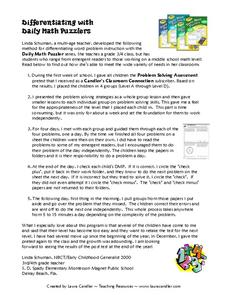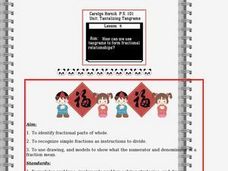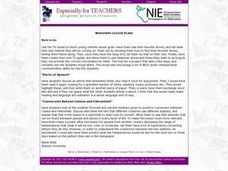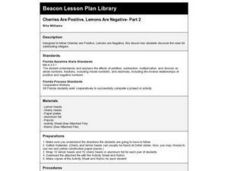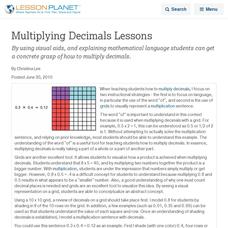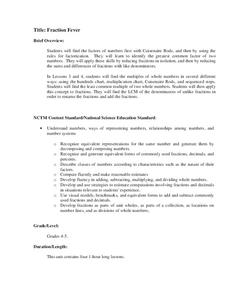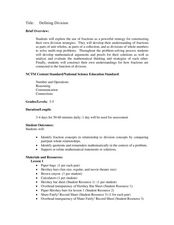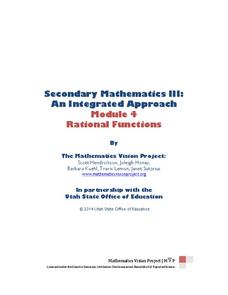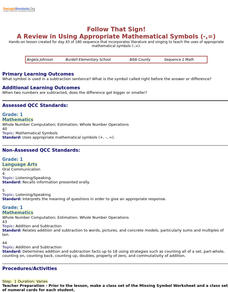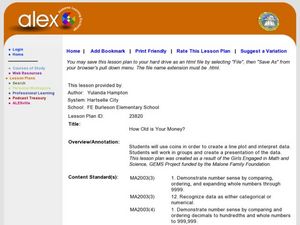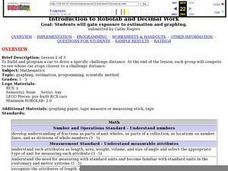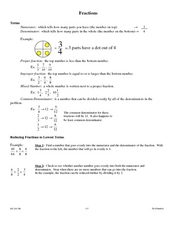Curated OER
How Much is Shaded?
In this math worksheet, students examine 32 fraction circles with different fractional parts shaded in each. Students write the fraction that goes with each picture.
Curated OER
Differentiating with Daily Math Puzzlers
Students practice word problems based on their own needs and skill levels. In this math word problems lesson, students practice completing one word problem each day until they can move on to the next level.
Curated OER
Fraction Strips--Equivalent Fraction Pieces With Only One Piece Labeled
In this math worksheet, students use the fraction strips to label the parts of one whole and discover equivalent fractions. The first fraction is labeled in each strip to clue students on how to write the remaining fractions.
Curated OER
Circle Percentages
In this math worksheet, students analyze 12 circles which have been divided into 2 or more sectors. Inside each part, students write the percentage of the whole circle that each sector represents.
Curated OER
Tantalizing Tangrams: Fractional Relationships
Students use tangrams to represent parts of a whole. In this fraction activity, students use tangrams to determine fractional relationships between different pieces. Students use the AppleWorks drawing application to demonstrate the...
Curated OER
Parts of a Whole
Fourth graders explore fractions through the analysis of various paintings. They view and discuss paintings by Picasso and Seurat, discuss the fractional examples in the paintings, and create a bar graph.
Curated OER
Using the Calculator (Part II)
First graders watch a demonstration by their teacher to see how to use a calculator. They identify the numbers being used and input them into the calculator. On a worksheet, they record the answer and use coins to show the total.
Fuel the Brain
Compare Fractions and Combine Fractional Parts to Describe a Whole
Given a picture of "crazy hats," your class will have to determine the different fractions associated with different patterns. Your youngsters will continue practicing their fraction skills with the other word story in this worksheet as...
Curated OER
Data Analysis, Probability, and Discrete Math: Lesson 6
Eighth graders engage in a instructional activity that is concerned with the concepts surrounding the interpretation of information included in graphs for analysis of data for probability. They examine circle graphs and differentiate the...
Curated OER
Math Grids
Fourth graders read an article, then search for verbs, adverbs, nouns, pronouns, etc. In groups, they exchange papers and try to guess what the other poem was about.
Curated OER
Cherries Are Positive, Lemons Are Negative- Part 2
Third graders, in groups, subtract integers by following Cherries are Positive, Lemons are Negative. They discover the rules for subtracting integers by using cherry heads and lemon heads.
Curated OER
Multiplying Decimals Lessons
By using visual aids, and explaining mathematical language students can get a concrete grasp of how to multiply decimals.
National Security Agency
Fraction Fever
This unit on fractions allows for upper-aged elementary learners to explore ways to find the greatest common factor and least common multiple of two numbers. Ultimately, young mathematicians will be able to identify equivalent fractions,...
Pennsylvania Department of Education
Using Polygons to Represent Fractions
Explore the world of fractions by using pattern blocks to show how different shapes can divide a hexagon. Elementary schoolers work in groups to complete these problems and to answer questions. Later, they work complete an independent...
Mathematics Vision Project
Module 3: Polynomial Functions
An informative module highlights eight polynomial concepts. Learners work with polynomial functions, expressions, and equations through graphing, simplifying, and solving.
Curated OER
Defining Division
Upper graders explore division through fair-shares. They will review fair shares and fractions as a segway into division. They start by playing "Share Fairly" game and create mathematical arguments for solving problems. Manipulatives and...
Mathematics Vision Project
Module 4: Rational Functions
Time to study the most sensible function — rational functions! The seven-lesson unit develops the concept of a rational function through a connection to rational numbers and fractions. Scholars graph functions, solve equations, and...
Curated OER
Follow That Sign! A Review in Using Appropriate Mathematical Symbols
Kids gain a deeper understanding of mathematical symbols, by playing an interactive game using flash cards. They complete an attached Missing Symbols Worksheet, flash card and an assessment are also included.
Alabama Learning Exchange
How Old is Your Money?
Elementary learners explore coin mint dates. First, they listen to the book Alexander Who Used to be Rich Last Sunday by Judith Viorst. They then sort a collection of coins according to their mint date and put them in order from oldest...
California Education Partners
Window Washers
Aim high with a task on window washers. An assessment task challenges learners to determine the number of windows two people wash. They do this using a given number of window rows on each side of a building. In addition, they find the...
Curated OER
Go The Distance Car Construction
Students build and program a car to drive a specific challenge distance.They must at the end of the lesson, have the car that stops the closest to a challenge distance.
Illustrative Mathematics
Cari's Aquarium
The volume of a fish tank is a rather important measure when it comes to building an aquarium for different species of fish. In this problem, your kids look at how many different ways they can make a fish tank of a specific volume,...
Curated OER
Fractions Forever!
Middle schoolers identify proper, improper fractions, and mixed numbers. They reduce fractions to their lowest terms. They add and subtract fractions with different denominators, and multiply and divide fractions, as well as...
National External Diploma Program Council
Measuring in Inches
Measure lines in inches using the most common tool of measurement: a ruler. Young mathematicians use a ruler to measure various lines. They also learn to round the the nearest quarter when measurements are not precise.

